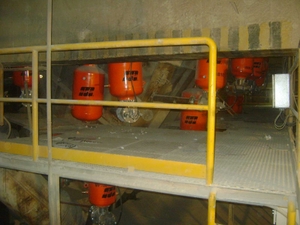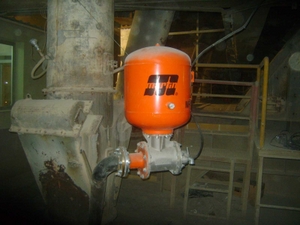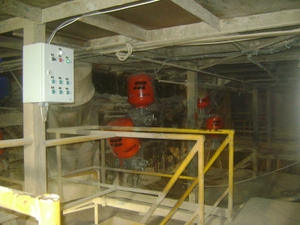Published: August 2nd 2016

A leading Turkish cement producer has specified high-performance air cannons to replace an under-performing existing system, which was jeopardizing the plant’s output capacity by failing to remove accumulated material from the preheaters. The new air cannon network resolves build-up issues that previously needed manual removal on a daily basis, which required at least two hours’ maintenance each time, as well as a monthly slowdown for a major cleaning.
To supply the cement industry in Turkey and other countries, the Izmir Cimentas plant manufactures 5,550 tons per day of clinker from two production lines. Located in Izmir’s city center, the facility is one of the four cement plants belonging to Cementir Holding, acquired in 2001. Cimentas is the first foreign-owned Turkish cement producer, and has a total annual production capacity of 5.4 million tons. Since 2001 Cementir has invested more than $530 million USD to expand capacity and increase efficiency, consolidating and enhancing its presence in Turkey.
To address the material build-up issue, the plant decided to have a detailed survey performed by Martin Engineering technicians, who inspected the preheaters and planned out a solution that included upgrading all air cannons on the entire preheater tower of the 3rd line with Martin Engineering air cannons. On 15 January, 2010, a purchase order was received from Cimentas headquarters of Turkey, with a tentative installation date in mid-March.
However, just three days later, officials from the plant called Martin Engineering Turkey’s office in Istanbul, explaining that the facility now hoped to use an outage of just ten days to install the air cannons, starting immediately.

Martin Engineering Turkey placed a rush on the order, delivering 50 high temperature nozzles, 50 air cannons and a variety of pneumatic components and control systems to the plant within a few working days. On the second day of the shutdown, Martin Engineering Service technicians arrived at the plant to begin the upgrade, working through the night until the changes were complete, supervising the installation and helping to program the firing sequences.
The Martin® Air Cannons with Tornado Exhaust valves fire a powerful discharge of compressed air to remove material adhered to the vessel walls. Introduced by Martin Engineering in 1974, the technology has since developed a proven track record around the world for relieving bottlenecks caused by material buildup in high-capacity storage and process vessels.
The air cannon combines a fast-acting, high-flow valve with a pressure vessel (tank). It performs work when compressed air (or some other inert gas) in the tank is suddenly released by the valve and directed through a nozzle, which is strategically positioned in the tower, duct, cyclone or other location. Often installed in a series and precisely sequenced for maximum effect, the network can be timed to best suit individual process conditions or material characteristics.
The timed discharge breaks down material accumulations and opens blocked pathways, allowing solids and/or gases to resume normal flow. In order to customize the air cannon installation to the service environment, specific air blast characteristics can be achieved by manipulating the operating pressure, tank volume, valve design and nozzle shape.

Described as the latest advancement in air cannon valve design, the patent-pending Tornado valve fires in response to an air pressure surge delivered by a solenoid. The design improves air cannon safety, as discharge requires a positive signal. Unlike negative pressure-firing designs, a cannon equipped with the Tornado valve will not discharge accidentally in response to a drop in pressure, so an air supply failure or broken line won’t trigger its firing.
The positive action of the valve also delivers faster discharge, amplifying output force by as much as 20% over standard air cannon designs. The fast-acting valves can release the tank volume in less than 300 milliseconds, creating a high-magnitude force at the exit nozzle that’s installed through the wall of the vessel or duct. In addition, the improved air path of the Tornado fills the reservoir 3-4 times faster than standard cannons.
Since the air cannon installation was completed in February, 2010, no manual cleaning has been needed in the entire preheater tower. Plant officials relayed positive references to another Cimentas plant in Turkey, leading to a similar system being installed at the Cimentas Elazig plant.